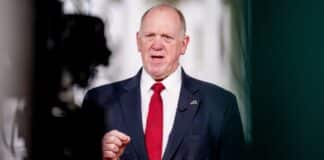On March 11, the First Circuit Court of Appeals denied the Trump administration’s request to lift a nationwide injunction on President Donald Trump’s executive order aimed at ending birthright citizenship. This decision maintains the block on the order, pending further appeals.
The executive order, signed on January 20, seeks to reinterpret the 14th Amendment by denying citizenship to children born in the United States to parents who are neither U.S. citizens nor lawful permanent residents. This move challenges the long-standing principle of jus soli, or “right of the soil,” which grants citizenship to nearly all individuals born on U.S. soil.
Immediately after its issuance, the executive order faced multiple legal challenges. On January 23, 2025, U.S. District Judge John C. Coughenour issued a temporary restraining order, labeling the directive “blatantly unconstitutional.” Subsequently, on February 6, Judge Coughenour granted a preliminary injunction, effectively halting the enforcement of the order nationwide.
The Trump administration appealed this injunction to the First Circuit Court of Appeals. However, the appellate court, led by Chief Judge David Barron, denied the government’s request to lift the injunction. In a 32-page ruling, Judge Barron stated that the administration did not make a “strong showing” that the states lacked standing under Article III of the Constitution.
Central to this legal battle is the interpretation of the 14th Amendment’s Citizenship Clause, which grants citizenship to “all persons born or naturalized in the United States, and subject to the jurisdiction thereof.” The administration contends that children of noncitizens are not “subject to the jurisdiction” of the United States and, therefore, not entitled to citizenship.
Opponents argue that this interpretation contradicts over a century of legal precedent, notably the 1898 Supreme Court decision in United States v. Wong Kim Ark, which affirmed birthright citizenship for nearly all individuals born on U.S. soil, regardless of their parents’ nationality.
As the legal proceedings continue, the executive order remains unenforceable. The administration may seek further review, potentially escalating the matter to the Supreme Court.






